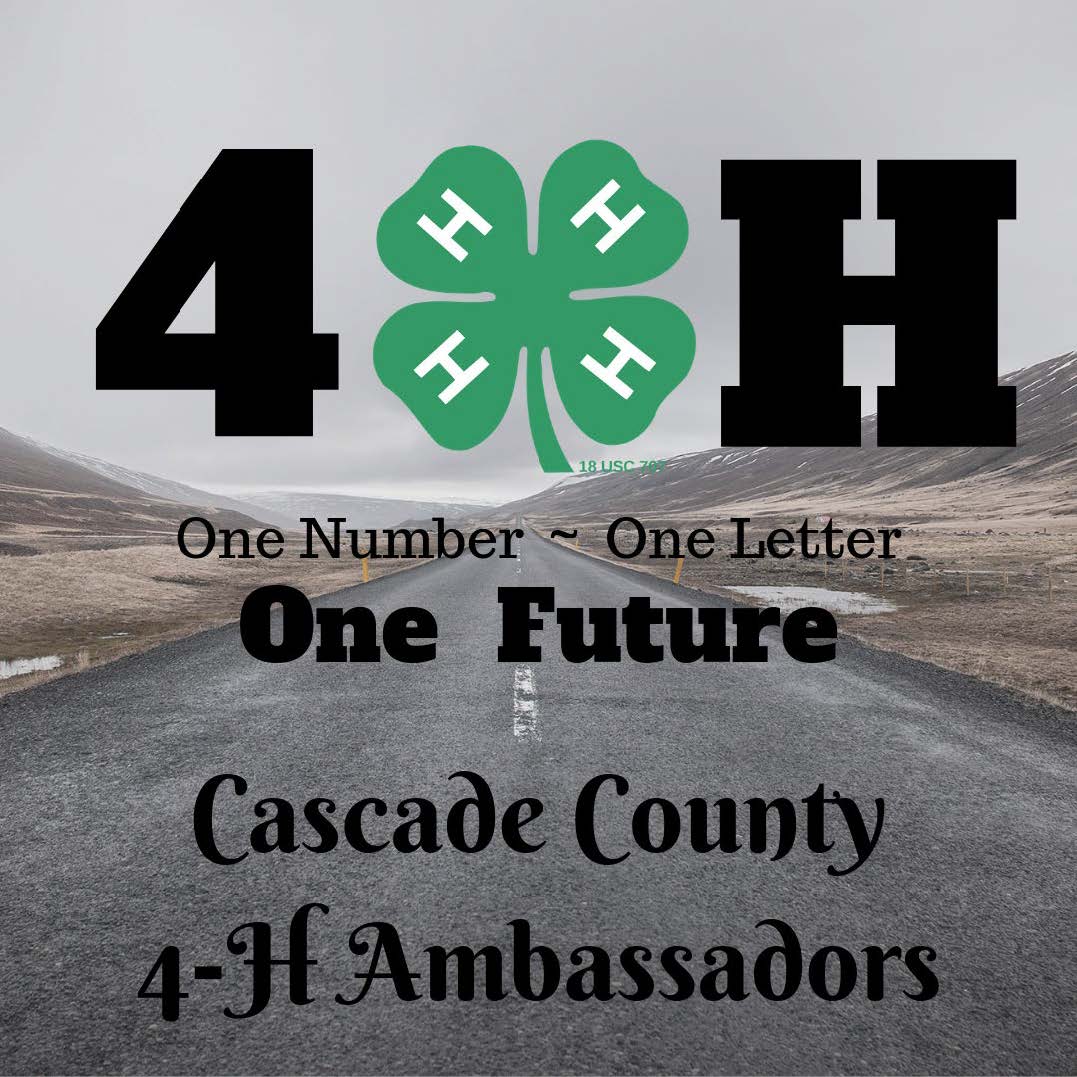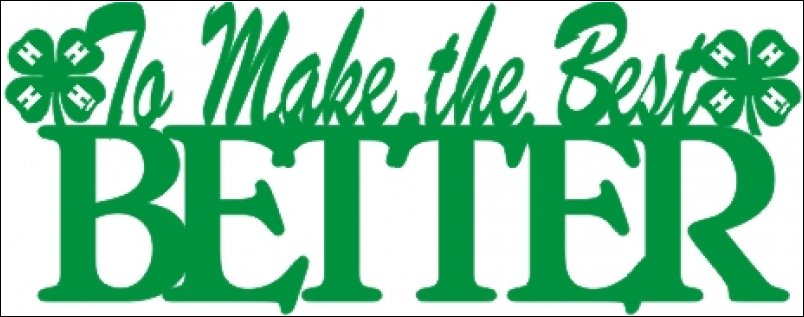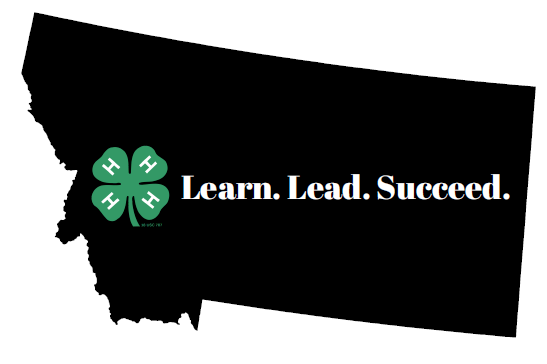Cascade County 4-H Ambassador Handbook
The contents of this Handbook have been adapted from the Montana 4-H State Ambassador Handbook
Alternatively, download a printable version of the 2021 Cascade County 4-H Ambassador Handbook
What is a Cascade County 4-H Ambassador?
A 4-H Ambassador is an official envoy, an authorized representative of the Cascade County 4-H Program. A Cascade County 4-H Ambassador is a self-motivated, enthusiastic leader who promotes 4-H using the skill, knowledge and leadership abilities acquired in 4-H with fellow members, area residents, community leaders, elected officials and non-4-H youth. A 4-H Ambassador serves to strengthen the 4-H program through public relations.

Cascade County 4-H Ambassador Program
Outstanding 4-H members are chosen from active clubs throughout the county. Cascade County 4-H Ambassadors have the opportunity to extend their service beyond the county level, by serving on both county and state levels as officers.
Being a Cascade County 4-H Ambassador is an honor and a privilege and shows acceptance of great responsibility and a total commitment to the Cascade County 4-H Program. Cascade County 4-H Ambassadors are youth that are engaged in leadership, service and promotion of the Cascade County 4-H Program.
Purpose
- Represent 4-H in a public relations role
- Promote 4-H with potential members, parents, and the general public
- Help plan, implement, and evaluate 4-H events
- Organize 4-H promotional activities
- Develop personal leadership skills and self-confidence
- Encourage financial support for 4-H
Duties
- Attend State Fall Leadership Training
- Attend Cascade County Ambassador Orientation session
- Attend monthly Ambassador meetings
- Serve as a 4-H representative to other county organizations
- Serve as a coordinator, monitor or emcee for 4-H activities and events
- Meet with 4-H supporters and potential donors
- Recruit new members and help organize new clubs
- Make friends and have fun
- Work directly with county 4-H leaders
- Attend teen retreats such as Rec Lab, Junior Leadership Camp, and 4-H Camp
- Teach 4-H Leadership workshops
- Assist the Cascade County Extension Office in promotion and public relations
- Coordinate service activities
Qualifications
- Must be 14 years of age by October 1 of current 4-H year
- Must have been enrolled in 4-H for at least 2 years and enrolled in 4-H for the current year
- Must be or have been a club officer
- Must have completed a recrd book in the previous 4-H year
- Must have an enthusiastic desire to serve and accept the responsibilities outlined in the Cascade County Ambassador Handbook
- Must submit to the selection process
- Must be responsible and have time available to fulfill the role
- Must be willing to travel, attend training sessions, and serve in the Ambassador role when asked
- Must have a minimum overall high school GPA of 2.5
- Must have the support of parents and/or guardians
- Must be capable and willing to get out of school on a limited basis for special programs
- Must be enrolled in the Leadership Project
Selection Process
Active 4-H members interested in becoming a Cascade County 4-H Ambassador can submit a completed application form to the Cascade County Extension Office. Each Ambassador serves a one-year term and must reapply each subsequent year.
Interested 4-H members must:
- Complete the application form
- Submit a letter of endorsement from a 4-H Leader
- Submit a letter of endorsement from a 4-H peer
- Advance to the interview
The Ambassador Selection Committee may be comprised of the Ambassador Team Advisor, 4-H Extension Agent, a Leaders Council Officer, a Cascade 4-H Foundation member, and past Cascade County 4-H Ambassadors.
Cascade County 4-H Ambassador Officers
Each Cascade County 4-H Ambassador will be selected to fulfill an officer position on the team. Officer selections will be made at the Ambassador Retreat in August of the 4-H year.
- President - The President is the coordinator of the group and leads the group during meetings. The President works closely with the Team Advisor and 4-H Extension Agent to plan meetings and set agendas.
- Publicity Chair - The Publicity Chair writes and publishes the Ambassador News for the Extension Newsletter. The Publicity Chair arranges for and provides other county publicity related to the Ambassador Program and serves as secretary to keep minutes of all meetings.
- Cascade 4-H Foundation Representative - The Foundation Representative attends all Foundation meetings and reports activities of the Ambassador Team to the Foundation. The Representative also acts as the Team's Treasurer and presents a report to the team and identifies needs for fundraising.
- Cascade County 4-H Leaders Council Representative - The Leaders Council Representative attends all Council meetings and reports activities of the Ambassador Team to the Leaders Council as well as promotes Council supported events.

Cascade County 4-H Ambassador Code of Ethics & Professionalism
A 4-H Ambassador may be released of their duties willingly or by involuntary discharge.
Ambassadors are expected to be part of the Ambassador team and fulfill the responsibilities
in the Plan of Action. If an Ambassador does not meet expectations of attendance,
commitment, or behavioral standards that Ambassador may be discharged at any time.
Depending on the level of undesirable conduct, an
Ambassador may be issued a warning to correct the behavior and/or participation or
an Ambassador may be immediately discharged without notice. All discussions will be
between the 4-H Extension Agent, Team Advisor and the Ambassador. At their discretion,
the 4-H Extension Agent, with the Team Advisor, may consult with the Ambassador’s
parent or guardian.
A Cascade County 4-H Ambassador must abide by the following 4-H Code of Conduct:
- Obey all rules established by the 4‐H program, the local 4‐H program and all local, state and federal laws.
- Conduct themselves at all times in order to be a credit to the club, school and community.
- Dress neatly and appropriately for the occasion and in accordance with the activity dress code.
- Show respect for the rights and property of others; be courteous at all times.
- Be honest and not take unfair advantage of others.
- Refrain from disruptive behavior and swearing.
- Demonstrate sportsmanship, modesty in winning and generosity in defeat.
- Attend meetings and sessions promptly and respect the opinion of others in discussion.
- Be respectful of the authority of adult volunteers, youth leaders, 4‐H staff and others in leadership roles.
- Not use, accept or carry alcohol, drugs or tobacco, or associate with others using the substances.
While attending overnight events, they will also:
- Not leave the activity or event unless permission is secured from agent or chaperone.
- Not use personal vehicle when it is not allowed by an event or trip.
- Care for the lodging property and respect the rights of other guests of the facility and observe all rules instituted by the property.
- Be in sleeping area and stay there after curfew time and be out each day by the set time.
- Not enter the sleeping areas of members of the opposite gender and not invite non 4‐H participants to the sleeping areas.
- Respect supervision at all times, being responsible to all adults connected with the trip or event.
- Be prepared to report to local 4‐H program knowledge gained by attending these activities.
Dress Code
Attire is the first form of professionalism. Cascade County 4-H Ambassadors will be expected to dress appropriately for each engagement and event attended. Ambassadors may be instructed to wear formal business attire, business attire, business casual attire, or casual attire. The guidelines for all forms of attire are as follows:
- State-issued Ambassador nametag must always be worn to 4-H events on the right lapel
- Nametag should be straight, clean, and visible – not hidden under jackets, hair, or other clothing such as scarves
- Clothing must be clean and pressed
- Hair should be clean and well-kept and styled in a fashion according to recommendations
Formal Business Attire
- Knee-length to full-length dresses. Dresses may not be strapless nor show any amount of cleavage and must cover more than 50% of the back.
- Blazer jackets
- White button-up shirts
- Black slacks
- Dress shoes and an appropriate tie
- Shoulder-length or longer hair must be worn in an up-do. Hair should be clean and well-dept.
Business Attire
- Button-up long-sleeved shirt that is pressed and clean with black slacks or knee-length skirt and dress shoes. Dress shoes should be closed toe.
- Shoulder-length or longer hair should be pulled back away from the face in a tidy-fashion.
Business Casual Attire
- Short-sleeved polo shirt with khaki slacks and appropriate shoes.
- Shoulder-length hair should be pulled back away from the face in a tidy-fashion.
- Boots are acceptable if they are clean and polished and free from debris.
Casual Attire
- 4-H branded t-shirt and dark denim jeans.
- Boots are acceptable as long as they are clean and polished and free from debris.
- Ball caps may be worn as well if they are 4-H branded and clean.
Cascade County 4-H Ambassador Events Timeline
Below is a general timeline of Ambassador events. Dates will be determined at the beginning of each 4-H year.
July
- Attend Montana 4-H Congress
- Assist with Cascade County Livestock Show
- Participate and assist with Fair activities (interview judging, public speaking contest)
- Participate in Ambassador Team Celebration
- Assist with Cascade County Horse Show
August/September
- Promote 4-H at fairs, schools, 4-H groups, and service clubs (this should be ongoing throughout the year)
- Attend Cascade County 4-H Ambassador Retreat
October
- Lead special promotions during National 4-H Week
- Attend Ambassador Fall Training
- Plan and participate in Cascade County Achievement Program
November
- Submit Ambassador Plan of Action to the Cascade County Extension Office
January
- Attend Montana 4-H Legislative Breakfast
- Assist with KMON contests and attend Great Falls Chamber of Commerce Ag Banquet
February/ March/ April
- Participate in National Volunteer Week/Week of Service
- Assist with Cascade County Communications Contest
- Attend Rec Lab
May/June
- Plan and participate in 4-H Camp
- Assist with Cascade County Foods Festival Contest
- Assist with Cascade County Fashion Revue

Cascade County Extension Agent Roles & Responsibilities
The Cascade County Extension Agent assigned to the 4-H program has the ultimate responsibility for the 4-H Ambassador program. Because the 4-H Extension Agent has many tasks, a Team Advisor will be selected and in charge of the Ambassador Program. The 4-H Extension Agent's role is one of support. It is important the Agent does not take charge of this program. The Agent will help the Team Advisor be successful in developing people who become Ambassadors.
- Meet with the Team Advisor and review the purposes of the Ambassador Program
- Develop a job description for the Team Advisor so everyone is clear on the expectation of the program, and the expectation of the Team Advisor
- Provide all communications for the program to the Team Advisor
- Identify ways to utilize Ambassadors' talents in the 4-H program, at county 4-H events, with civic club, schools, and within the county
- The 4-H Extension Agent's role is one of support. It is important the Agent does not take charge of this program. The agent will help the Team Advisor be successful in developing the young people who become Ambassadors
- Evaluate the Cascade County 4-H Ambassador program with the Team Advisor and the Ambassadors and provide suggestions for improvement of the program

Team Advisor Roles and Responsibilities
The Team Advisor will receive training at the Ambassador Fall Training in October of each year. The Team Advisor may also attend the trainings and workshops held during District Leaders Meetings, State Leaders Forum, and State 4-H Congress.
If any questions or problems arise that cannot be answered on the local or county level, the Team Advisor may contact the Volunteer State Advisors or the State Staff person assigned to the Ambassador Program.
- Be willing to assume the Team Advisor role for at least two years
- Along with the Cascade County 4-H Extension Agent, develop a clear understanding of what is expected of the Team Advisor, the Ambassador Program and the 4-H Extension Agent
- Keep the 4-H Extension Agent informed of what is happening with the Ambassador Program
- Assist in developing and writing a Plan of Action for their activities
• Assist in establishing and attaining goals that are realistic and tailored to individual abilities and talents - Assist in attending training to help make them successful in their role
- Provide training to the Ambassadors on a county level
- Assist in developing and providing leadership and public relations training programs for 4-H and other youth
- Serve as a communication link between the county, district, and state 4-H Councils and County Ambassadors
- Chair the selection process for Cascade County Ambassadors
- Design the selection process as an educational experience for both the selection committee and the Ambassador candidates
- Submit the names and addresses of Ambassadors annually to the State 4-H Office
- Assist Ambassadors in reporting their activities as follows:
- Making a county report.
- Sending county report to designated district 4-H Council representative.
Cascade County 4-H Ambassador Tip Sheet: Speaking Events
Who contacts the groups that Ambassadors will speak to?
The Cascade County Extension Agent will make initial contacts with potential audiences. All mailing and correspondence should be done thorough the Extension Office.
Extension Agent/Team Leader Duties:
Who to Contact:
- Cascade County 4-H Ambassadors should speak to at least one adult civic group
- Make a master list of all potential speaking groups in the county
- Conduct an internet search - look under clubs, government offices, etc.
- Be creative in looking for potential speaking groups: lawyers, associations, food co-ops, etc.
- Ask county 4-H Leaders to volunteer to appear with Ambassadors
How to Contact:
- Send out Ambassador Flyers to all groups on the master list
- Follow-up with a letter or a phone call
- When flyers are filled out and returned, contact the group and find out their meeting times
- Contact Ambassadors to see who is available
- Call group back and schedule the engagement
- Send the group the appropriate Ambassador's biography
- Introduce ambassadors to newspaper editors and civic leaders
- Ambassadors will then know who to approach after this initial introduction
Ambassador Duties:
- Before speech:
- Ask the contact person about the group you will be speaking to
- Find out the interest of the group, what size the room will be, if there will be a podium and a microphone, and be prepared for the unexpected
- Confirm the time, date and place with your Team Advisor or the contact person
- At speaking engagement:
- Dress appropriately
- Arrive at least 15 minutes early because Cascade County 4-H Ambassadors are never late
General Tips
- Know the organization you will be visiting and carefully review all of the materials you received on the organization
- Learn as much information beforehand of what is expected of you: speech, meal event, presentation, host, etc.
- Arrive 15-30 minutes early depending on your responsibility and ask questions as to your role
- Have an awareness of 4-H private/public partnership (USDA, Land Grant University, Extension System, 4-H national, state, county)
- Review general 4-H information: national statistics, 4-H programs (animal/livestock, public speaking, health, nutrition, clothing, etc.) and know what programs are going on in Cascade County
- Remember most of all, 4-H strives to encourage the development of leadership and life skills
- Be ready to share (if asked)
- Your 4-H story
- Benefits of 4-H to your values/future career
- The impact of your community service activities
- Prepare a 5-10 minute script even if you don't use it
- Enter/exit all functions as a Cascade County 4-H Ambassador
- Have a good stage presence - look interested, have good posture, little movement, no gum
- Mingle if you are among many people and don't hesitate to make the first move to shake hands and introduce yourself
Resource Materials
Why Should 4-H Exist?
On occasion, someone raises the question about the need for 4-H. "Why should 4-H exist?" "Why should 4-H receive public support when other youth programs like Scouts don't?" These are good questions, and we must be ready with responses. There are several ways 4-H is different from other youth development programs. Knowling these reasons may help us understand why we "need" 4-H.
A national task force on out-of-classroom education suggested that 4-H embodies a certain genius and demonstrated effectiveness, causing it to be worthy of expansion to more youth (USDA/ES, 1980).
The genius of 4-H was summarized by this task force as:
- Providing learning experiences for boys and girls together which contribute to both personal and social development for both youth and adults
- Using real life work experiences while letting youth set their own goals for achievement rather than prescribing goals that must be met for recognition
- Encouraging individual initiative and providing opportunities for young people to experience success, which in turn raises the level of their aspirations and contributions to a feeling of positive self-worth
- Incorporating the techniques of "learning by doing" directed toward personal development
- Providing laboratory situations for individual learning in practical projects and activities
- Providing opportunities for young people to practice democratic group action and social development through group experiences
- Providing safe, nurturing relationships between youth and adults which help integrate youth into society and keeps adults in-tune with the needs and interests of youth
- Extending the influence of homes, schools, and other aspects of participants' lives through its complementary relationships
But what about our funding? Isn't 4-H just another drain on government funds? 4-H programs receive the bulk of their funding from volunteers, kind contributions and donations. A small portion of 4-H programs are funded with public dollars.
But how is 4-H unique of different form other youth programs? There are many aspects of 4-H that make it a unique youth development program. Some of these aspects include:
Land Grant University Affiliation
As part of the land grant university and the Cooperative Extension System, 4-H provides informal, off campus, research based educational programs to the public. These programs are based on youth development research from the entire land grant university system. 4-H is an off campus laboratory of learning.
The cooperative relationship that exists between 4-H state and local governments, and the U.S. Department of Agriculture provides a unique foundation for the 4-H program. The resources and knowledge of these entities are available to 4-H clubs.
Availability
4-H is made available to youth in every county of the nation. Its presence is ubiquitous. The 4-H and Extension network is the envy of many organizations and this system has been copied by numerous countries around the world.
Co-educational Program
4-H is co-educational and fully integrated. Believing that positive youth development occurs in natural social groups, 4-H encourages both boys and girls to interact in healthy, respectful environments with caring adults. 4-H membership is open to all youth regardless of race, gender, color, national origin, or handicap.
Link to University Research
4-H youth development programs are based on university, research-based knowledge. The knowledge base includes principles of youth development as well as subject matter knowledge offered through a variety of 4-H projects. For example, sonograms for livestock evaluation, feeding rations, crop varieties, range management principles, ages and stages of youth development and leadership principles are all included in this knowledge.
Professionally Trained Staff
4-H retains a small cadre of professionally trained university faculty members who manage and direct 4-H's youth development efforts. These professionals in turn recruit, orient, train, and support a large volunteer force who form the backbone of 4-H youth development programs. The relationship between volunteers and salaried staff is cooperative in nature and essential to keeping 4-H programs on a sound educational foundation.
Montana Ambassadors Reaching Out to New Audiences
The primary purpose of the 4-H Ambassador program is to promote 4-H throughout the entire state and possibly, country.
Some suggestions to assist in the promotion of 4-H include:
Encourage the community to participate in 4-H
- If people know what the 4-H program in their area does and how kids benefit from it, they are more likely to become involved in 4-H as members, volunteers, and donors.
Speak to county officials
- Ambassadors can generate funding for 4-H and broaden the image of 4-H by encouraging sponsorship for projects or programs
Tell the 4-H Story
- Work with the media to tell the 4-H story
- Create a 30 second public service announcement about 4-H activities
- Hold a talent show; call upon members to give demonstrations, feature 4-H talks, or special talents
Promote 4-H visitors of the state
- Use the large number of tourist area to your advantage!
- Encourage those you come into contact with to become acquainted with the 4-H club program in their area
Remember, if young people do not "tell the 4-H story" then no one will. Often 4-Her's are more successful in telling their own story than relying on someone else to do it.
4-H is learning the value of planning, hard work, serving others, and always striving for the best. These values taught by 4-H may have their roots in rural America, but today, no single address determines where they can be learned. By providing the right kind of real-life experiences, regardless of the setting, these values can be learned.
The national 4-H emblem is a green four-leaf clover with the white letter "H" in each leaf. The four-leaf clover is a lucky symbol, but 4-H members learn to make their own "luck" by learning and developing skills that will help them to take advantage of opportunities when they come along. The 4-H colors are green and white. Green is emblematic of spring life and youth, while white stands for high ideals. The 4-H motto is "To Make the Best Better."
Each generation puts its unique stamp on 4-H, but the 4-H pledge continues to be meaningful for youth everywhere. The following is the 4-H pledge:

The five skills that 4-H works to instill in youth are:
- Foster a positive self-concept
- Learn decision-making and responsibility
- Develop an inquiring mind
- relate to self and others
- Acquire a concern of communities local and global
The 4-H Vision
4-H is a world leader in helping youth become productive citizens and catalysts for positive change to meet the needs of a diverse and changing society. Through 4-H youth development education, youth will accomplish the following:
- Practice effective problem-solving and decision-making skills
- Practice responsible health behavior
- Be environmental stewards
- Possess positive work attitudes and skill diversity
- Contribute to positive relationships with families, peers, and community
- Demonstrate communication and leadership skills
- Value lifelong learning
- Feel the personal pride that comes with mastery
- Feel valued and utilized as a resource in their community
The 4-H Value Set
Youth development is the focus of everything we do, and 4-H allows individuals to unlock their potential through:
- Active involvement in self-determination of their learning activities
- Quality experiences that stimulate skills for living and life-long learning
- Relationships that empower people to voluntarily help themselves and each other
- Interaction with caring adults and peers to create a positive family-like support system
- Partnerships are essential in successful youth development for:
- Resource management
- Program innovation
- Delivery capabilities
- Creating and delivering caring environments
- Access to research-based knowledge
Volunteerism is fundamental to:
- Delivering quality programs
- Developing adult education capacity
- Teaching youth to volunteer
Diversity strengthens the ability of 4-H to:
- Develop positive values among the program participants in today's global society
- Provide opportunities for program involvement regardless of economic, social, culture, age, disability, or gender
The 4-H Mission
The 4-H youth development education program creates supportive environments for culturally diverse youth and adults to reach their fullest potential. In support of this mission we will:
- Provide formal and non-formal community focused experiential learning
- Develop skills that benefit youth through life
- Foster leadership and volunteerism in youth and adults
- Build internal and external partnerships for programming and funding
- Use research-based knowledge and the land grant university system
Achievement of this mission will result in capable, competent and caring citizens.

